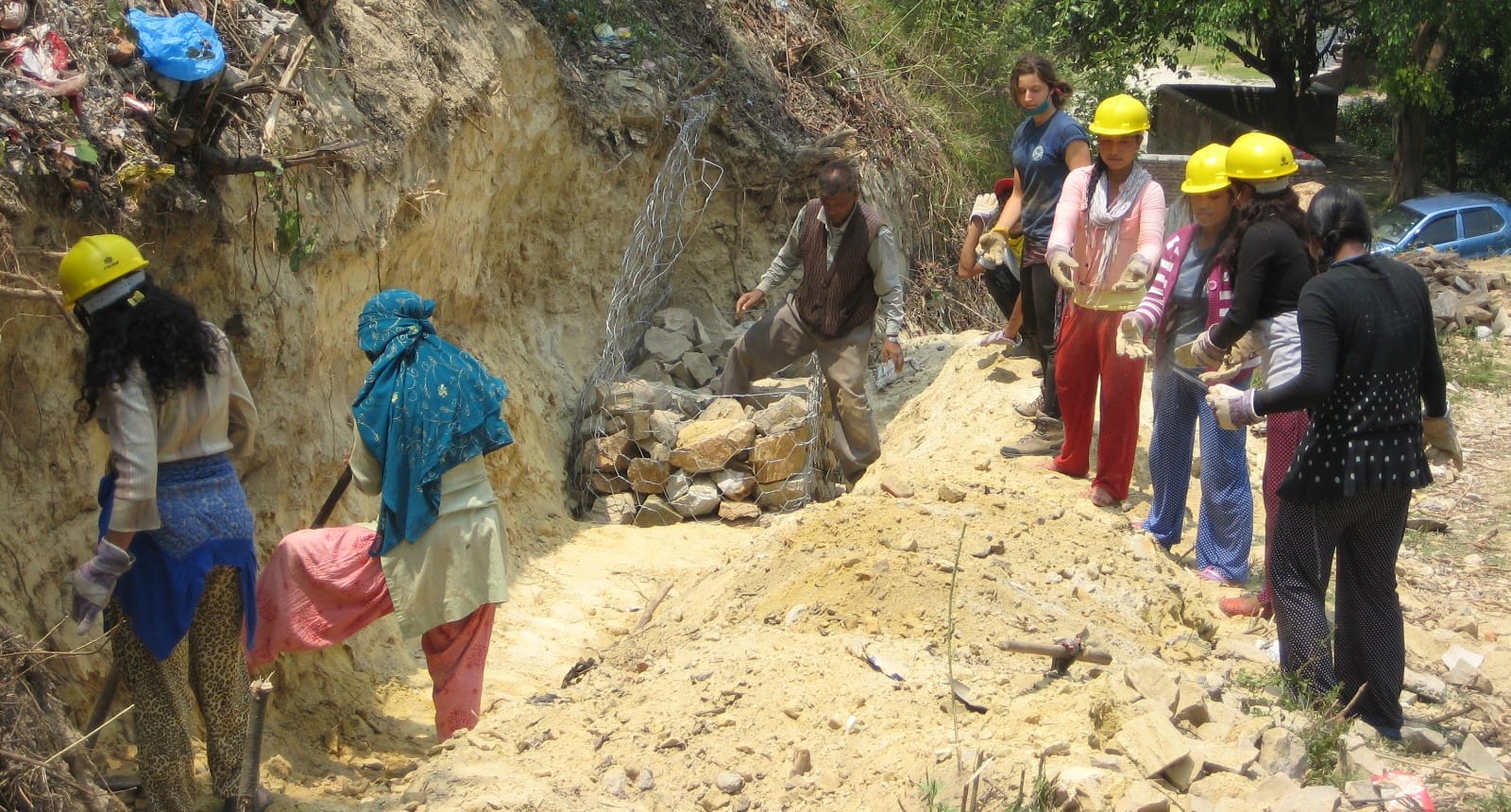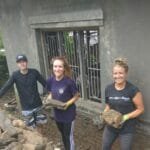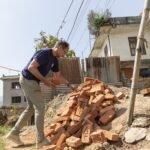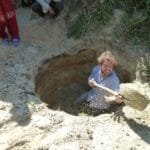
Emergency Disaster Relief Volunteering – Make a Global Impact
Emergency disaster relief volunteering involves providing immediate assistance to communities affected by natural or man-made disasters, such as earthquakes, floods, landslides, and fires. Volunteers support various relief activities, including distributing emergency aid, setting up shelters, offering medical care, and helping rebuild infrastructure. They are crucial in ensuring swift recovery and enhancing community resilience in disasters. Volunteers also contribute to disaster preparedness, ensuring communities are better equipped to handle future crises.
Nepal’s Vulnerability to Natural Disasters
- Earthquakes, floods, and landslides are frequent disasters in Nepal, and earthquake response has been critical since the devastating 2015 earthquake.
- Floods and landslides continue to disrupt communities, leaving them needing immediate emergency aid.
- Nepal’s challenging geography makes it especially susceptible to natural disaster relief volunteer needs.
Make a Tangible Impact
- Emergency disaster relief volunteering allows you to contribute to disaster response initiatives and post-disaster recovery efforts directly.
- Volunteers help provide immediate disaster response aid, rebuild infrastructure, and support communities long-term.
- Volunteer disaster response efforts can include flood relief volunteering, earthquake relief, and disaster support work that provides disaster relief volunteer and emergency relief efforts.
Hands-on Volunteering with ViN
- By joining disaster relief volunteer organizations like ViN, you can be part of crucial recovery programs in Nepal.
- Engage in recovery aid and rebuilding efforts and contribute to disaster management roles for communities affected by earthquakes, floods, and landslides.
- ViN’s programs allow you to work on disaster recovery volunteer projects, including disaster response volunteers supporting local efforts.
Immersive Cultural and Humanitarian Exchange
- While providing disaster relief, you’ll also experience Nepal’s rich cultural heritage and stunning landscapes, enriching your volunteer experience.
- Volunteering for disaster relief combines humanitarian disaster relief volunteering with exposure to the diverse traditions of Nepal’s communities.
- It’s an opportunity to connect with local cultures and learn while making a significant difference in their recovery.
A Global Effort to Strengthen Communities
- Volunteers help strengthen communities affected by natural disasters, supporting them in disaster recovery and emergency response volunteering.
- Your efforts are part of global disaster recovery programs, aiming to empower communities with emergency preparedness and post-crisis recovery strategies.
- Disaster recovery volunteer work allows volunteers to assist in global disaster aid initiatives, offering critical help to those most in need.
Where Can You Find Disaster Relief Volunteer Opportunities?
- International disaster relief volunteer opportunities are abundant, with numerous organizations offering a variety of ways to get involved.
- ViN and other emergency relief NGOs offer structured disaster relief volunteer opportunities near you or abroad.
- Whether it’s volunteer flood relief or earthquake response, there are many ways to get involved and volunteer for disaster relief abroad or locally.
By volunteering in Nepal, you’ll join an impactful global network of disaster relief volunteers working on the frontlines to rebuild lives and communities after natural disasters. Your efforts will contribute to immediate recovery and long-term resilience for communities impacted by these crises.
Locations:
- Outskirts of Kathmandu
- Okhaldhunga in the Everest Region
- Nuwakot and any disaster-occurring regions.
These regions are disaster-prone and culturally significant, allowing volunteers to explore Nepal’s history and traditions while making a difference.
Duration:
Our programs range from 4 to 20 weeks, accommodating a variety of schedules and availability.
Goals of the Program
- Provide immediate emergency response aid during crises.
- Train communities in disaster preparedness and risk mitigation.
- Rebuild and restore critical infrastructure in post-disaster areas.
- Promote resilience through education and long-term recovery planning.
Community Impact
Your efforts will:
- Help rebuild homes, schools, and health facilities.
- Equip locals with skills for sustainable disaster management.
- Strengthen disaster recovery groups to handle future emergencies.
Volunteering for disaster relief in Nepal creates a tangible impact that benefits generations.
Disaster Relief Volunteer Roles
Volunteers will undertake varied tasks to address both immediate and long-term needs.
- Emergency Response Coordination: Assist local authorities in disaster management roles.
- Aid Distribution: Distribute essential supplies like food, water, and medical kits.
- Health Support: Provide basic first aid and assist medical teams in emergencies.
- Data Collection: Gather information on affected areas for better resource allocation.
- Community Training: Conduct workshops on disaster preparedness and emergency response.
- Rebuilding Efforts: Participate in post-disaster rehabilitation projects like rebuilding homes.
- Flood Relief Volunteering: Assist in water crisis relief and flood management.
- Emotional Support: Facilitate stress management and trauma counseling.
- Awareness Campaigns: Lead initiatives on natural disaster risk reduction.
- Cultural Research: Document traditional practices and their role in disaster recovery.
Sample Schedule for Emergency Disaster Relief Volunteering (7-Hour Workday)
- 10:00 AM – 1:00 PM: Educational Workshop (Disaster preparedness, first aid, emotional support)
- 1:00 PM – 2:00 PM: Lunch Break
- 2:00 PM – 3:00 PM: Manual Work (Clearing debris, construction, or reconstruction)
- 3:00 PM – 5:00 PM: Continue Manual Work (Debris clearing, rebuilding, or other hands-on tasks)
Skills You’ll Gain
- Crisis Management: Hands-on experience managing real-time disaster response.
- Leadership and Teamwork: Collaborate with diverse teams in high-pressure environments.
- Cross-Cultural Communication: Learn to navigate cultural differences effectively.
- Technical Skills: Gain knowledge in disaster recovery technologies and practices.
Career Growth
Volunteers receive certifications from the volunteer organization ViN. Networking with experts in global disaster recovery programs can lead to careers in humanitarian aid, emergency management, and international development.
Cultural Experience
Volunteering in Nepal offers deep cultural immersion. From learning the Nepali language to participating in local festivals, volunteers form meaningful connections with the communities they serve.
Who Can Apply?
We welcome volunteers aged 18 and above passionate about making a difference. No prior experience is required, but first aid, construction, or disaster management skills are a plus.
How to Apply
Step-by-step Guide:
- Complete the Online Application
- Submit Your Resume (CV): Include two referees’ contact details in the online form.
- Await Confirmation: VIN will review your application and notify you.
- Secure your spot by Paying a Booking Fee of 150 Euros.
- Receive Pre-Departure Pack: ViN provides essential pre-departure information after payment.
Housing and Meals
- Housing: Volunteers stay in comfortable homestays or hostels, ensuring a safe and welcoming environment.
- Meals: Nutritious local meals and vegetarian and special dietary needs options are provided.
Support System
- Predeparture calls
- On-arrival orientation: 2 days to 5 days to prepare for your role.
- 24/7 emergency assistance during the program.
Local coordinators to guide and support you.
Program Fees
Your program fees cover:
- Accommodation
- Meals
- Local transportation
- Orientation sessions
For detailed costs, visit the Fees section
Additional Costs
Participants are responsible for visa fees, international airfare, and travel insurance.
Why Choose ViN for Disaster Relief Volunteering?
- Impactful Work: Directly contribute to disaster recovery and resilience.
- Global Experience: Collaborate with international volunteers and NGOs.
- Sustainable Development Goals (SDGs): Align your work with global initiatives, such as SDG 11, Sustainable Cities and Communities.
Testimonials
“Volunteering in Nepal taught me resilience and compassion. I left a piece of my heart in the Himalayas.” – Emily, USA.
“Volunteering in Nepal’s post-disaster recovery efforts was a transformative experience. Helping rebuild homes and supporting communities after the earthquake gave me a deeper understanding of resilience and the importance of global disaster relief.” – John, UK.
“My time volunteering in Nepal’s emergency response programs showed me the true power of community. Working with local disaster relief teams to provide aid and rebuild homes was a life-changing experience I’ll never forget.” – Sarah, Canada.
“Being part of Nepal’s flood recovery efforts was incredibly rewarding. Through manual work like debris clearing and community rebuilding, I learned about disaster management while contributing to global recovery aid.” – Mark, Australia.
Desirable/ Common Skills
- Excellent communicator with good interpersonal skills
- A team player with good workethics
- Time management and leadership qualities
- Adaptable, flexible and able to work under pressure
- Accepting of different ideas and culture
- Problem solving: always be part of solutions than part of a problem
- Creative
- Positive attitude
Requirements
- Gender: Female / Male
- Minimum Age: 18+ years (16-17 years old person can volunteer but need to present parents’/ guardian’s consent letter)
- Language:English (Intermediate)
- Educational:High School Graduate
Your Experience/ Setting
Upon your arrival at Kathmandu Tribhuvan International Airport (TIA), you will receive a warm welcome and be transported to your hotel or hostel. If you are already in Nepal before the start of your placement, we can make alternative arrangements for you. You will undergo a comprehensive two- to three-day induction program after arrival. This induction will provide valuable information about your project and general information about the Nepalese language, culture, health, safety, and security. It is also an excellent opportunity to connect with fellow volunteers and interns who can become your companions for sightseeing and a source of support throughout your volunteer placement.
During the induction period, you will be accommodated in a budget hotel or hostel arranged by VIN. However, most of the VIN experience involves living with a Nepalese host family. While this immersion is essential for a complete experience, we understand that it can be challenging as you adapt to a new culture and adjust to facilities that may be more basic than you are accustomed to. Don’t worry; all our host families have experience accommodating volunteers, although their English-speaking abilities may vary. Also, you will have 24-hour access to our staff members for support and assistance throughout your placement.
Volunteers will be assigned to one of VIN’s working areas, which include Tarakeshor Municipality in Kathmandu, Taluwa, Thulachhap, and Bhadaure in Okhaldhunga, and Okharpouwa and Kaule in the Nuwakot district. While at the working site, volunteers are requested to bring their lunch box, water bottle, safety gear, face mask, and any other essential belongings. We advise volunteers to dress comfortably and modestly, preferably with long sleeves. Please get in touch with us for guidance and support if you want to raise project funds or collect project-specific resources. This will help the community a lot.
Schedule and Commitment
You will work five to six days a week, up to six hours per day. You may propose your preferred time and hours; however, the working time period will be dependent on the institution you have been placed. A minimum of 2 weeks’ time commitment is expected of a volunteer. The longer you commit; the better impact you can make. You should be willing to commit a certain amount of your free time and energy, show a lot of commitment and be a good listener. You are expected to work constructively and co-operatively maintaining good reputation and standards at all times. Volunteer should abide by relevant security concerns and access procedures. Moreover, you should be receptive and positive to performance appraisal, advice and feedback. Throughout your placement, you will have the full support of VIN. Your safety is our highest priority.
You will receive a clear and concise on-the-job instructions, course of action, context of work and policies/strategies before your placement begins. You will be provided with ample of guidance and support throughout the placement with trainings / onboarding sessions incase necessary. You will be in a constant communication and regular check-in with the VIN volunteer coordinator. VIN aims to maintain a culture of continuous feedback between the volunteer supervisor at the placement to monitor the performance of the volunteer and ensure the project delivers desired outcomes.
In case of an emergency, you may contact one of our Volunteer Coordinators who will be available anytime for your assistance and support.
Click here to Learn more on how volunteering works
Mid and Long Term Volunteers:
2 weeks minimum stay- € 380
3 weeks – 480€
4 weeks – 580€ (after 4th week, for each additional week €95)
University Internships:
4 weeks minimum stay- € 680 (for each additional week – €105
Click here to Learn what’s included and excluded in our Fees Section
Click here to Learn recruitment process on how volunteering works
Frequently Asked Questions (FAQs)
Our programs offer roles in emergency aid, rebuilding, DRR research, and community training tailored to make the most impact.
Apply through our website and attend a detailed orientation session.
No, but construction, first aid, or teaching skills are a bonus.
We primarily host volunteers in Nepal, but ViN can connect you with global disaster relief opportunities.
Volunteers support immediate aid efforts, assist in rebuilding, and train communities for future preparedness.
Yes, ViN prioritizes safety with robust support systems and secure accommodations.
Programs last from 4 weeks to several months, depending on your availability.
Our projects are open year-round, and our inductions begin on the first and third Mondays of each month. We would like to ask that volunteers arrive one day before the start of the induction. You can choose the duration of your participation based on your available time. However, so that you know, our volunteering placements are limited. We highly recommend booking your placement in advance to secure your placement. Click here to apply.
Email: support@vin.org.np
WhatsApp: +977 985 107 0477
Office Hours: 9:30 am – 5:00 pm Nepal time






 Member of
Member of